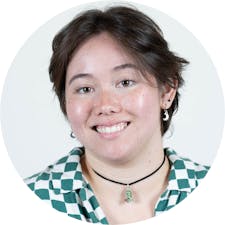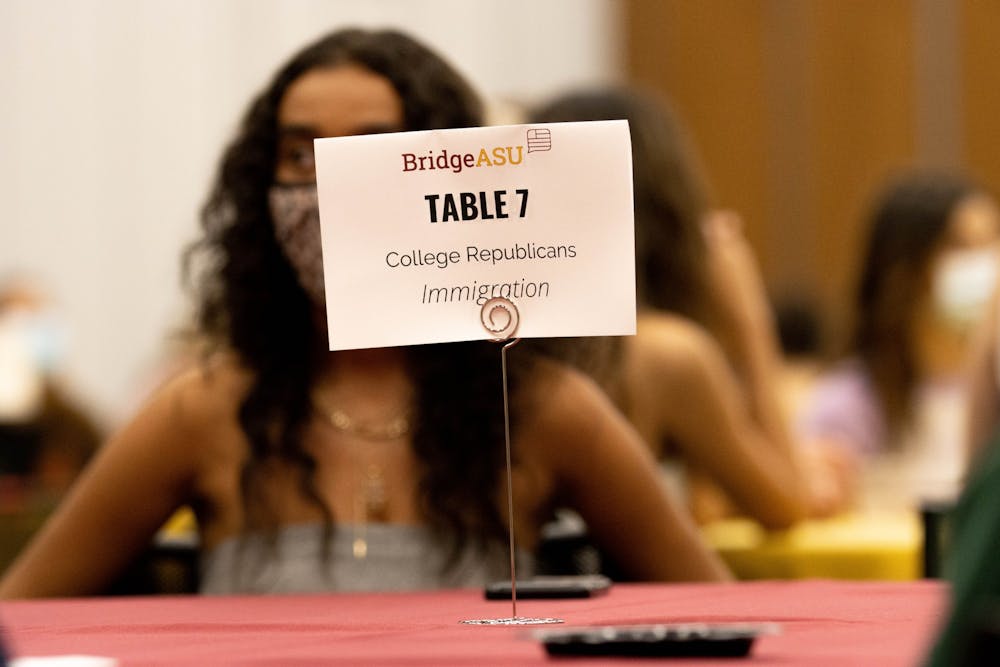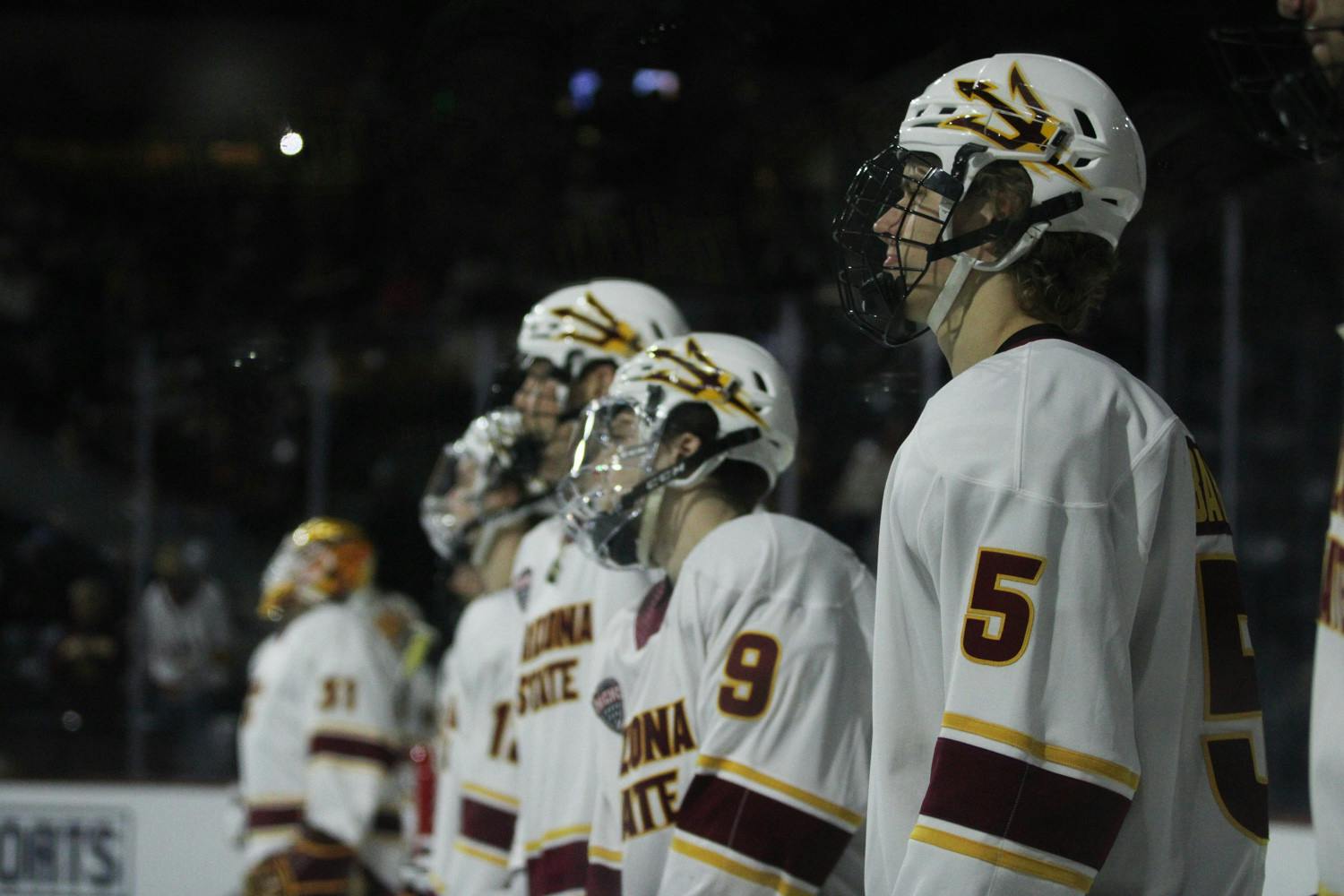Members of ASU’s political organizations, various students and professors, all with the intent of discussing politically divisive social issues, gathered in the Senita Ballroom for the third annual Bridge the Gap event Thursday.
Organized by Bridge ASU, the event was meant to provide a safe space for members of the University community to learn more about policy and gain an understanding of differing political views on issues likeCOVID-19 regulations, climate change, carrying firearms on campus, immigration, abortion, censorship and voting.
According to survey data gathered by the Pew Research Center, voter attitudes on disputes related to race, gender, religion and immigration were more polarized before the 2020 presidential election than they were in 2016.
Guest speakers and several student organizations — ASU Young Democrats, ASU College Republicans, the Alexander Hamilton Society, Young Americans for Liberty and more — divided into 17 stations. Each moderated 15-minute intervals of “civic dialogue” about a specific issue.
Due to COVID-19, Thursday's event was the first of its kind since 2019. Over 100 people attended this year’s event.
Makenzie Tyson, political affairs director at Bridge ASU and a junior studying political science and justice studies, kicked off this year’s event with words of encouragement in response to society’s intensifying political polarization.
“Bridge USA was born in the wake of the 2016 presidential election, when polarization and hostility were at all-time highs and unfortunately, those feelings have only increased,” Garcia said. “It’s going to take all of us committing to changing the political climate here at ASU if we want to change the political climate in our country.”
Jose Munguia, vice president of ASU Young Democrats and a senior studying economics, described Bridge the Gap as a place where students can learn to engage with people who have opposing ideas.
“We do have to listen to the other side, whether or not we agree with them,” Munguia said. “Then you might be friendly with them, not just see them as the enemy.”
Joe Pitts, president of ASU College Republicans and a junior studying management, led a conversation about the ethics of immigration policy, including a discussion of illegal immigration and those seeking asylum.
“(Students) still feel suffocated from saying certain things they want to say, certain viewpoints they want to express just because they’re afraid of what their professor might think of them or they’re afraid of what their fellow students might think of them,” Pitts said. “So I think an environment like this (at Bridge the Gap), which is welcoming to differing ideas and different voices, is really beneficial."
Media literacy educator and managing director of the Walter Cronkite School of Journalism and Mass Communication’s News Co/Lab, Kristy Roschke, said Bridge ASU requested her expertise on the media’s influence in the political climate.
“Nowadays the media can play a role in this and they can portray us as being almost irreparably divided," Roschke said. "There’s so much that makes us different, especially when it comes to political affiliation.”
Students and professors who attended Bridge the Gap were able to learn from each other, whether they joined a station for a short interval or moderated a conversation.
Alyssa Kihoi, vice president of Young Americans for Liberty, a senior studying criminology and criminal justice and the moderator of a conversation about carrying firearms on campus, said, “obviously, I know one side, but it was really nice to hear other student’s perspectives. That actually kind of made me double think how can we better approach this.”
Ethan Pelland, president of the Alexander Hamilton Society and a junior studying business data analytics, has participated in previous Bridge the Gap events and shared an appreciation for its uniqueness.
“I was telling them at my table, you don’t have to be an expert for us to have these conversations and you’ll learn by having a conversation,” Pelland said.
Similarly, Tyson expressed feelings of pride in Bridge ASU’s ability to unite people of diverse backgrounds and opinions.
“We may agree on the problem, we’re not going to agree on the solution. But as long as we agree that there is a problem and we need to do work to tackle that problem, then we are miles ahead of where we were,” Tyson said. “It’s a very powerful thing and I’m really proud of the work we do.”
Correction: This story was updated on Sept. 18 at 11:40 a.m. to correct Joe Pitts' title.
Correction: This story was updated again on Sept. 20 at 9:55 p.m. to correct a misattributed quote.
Reach the reporter at awaiss@asu.edu and follow @WaissAlexis on Twitter.
Like The State Press on Facebook and follow @statepress on Twitter.
Continue supporting student journalism and donate to The State Press today.

Alexis Waiss is an assignment editor and senior reporter, covering breaking news and writing long-form stories. Alexis worked on SP's politics desk for a year, where she reported on the Legislature, higher education policy, student government, the city of Tempe and stories highlighting social justice. She previously worked as a fellow for the Asian American Journalist Association's VOICES program.




